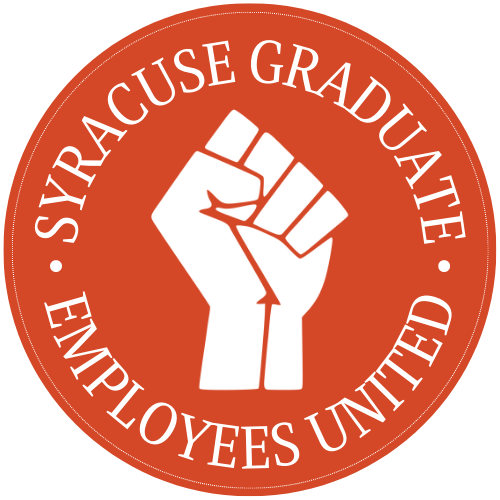Syracuse University grad students hold rally to form union: ‘SU works because we work’
By Eddie Velazquez, writer for Central Current | Published on January 17, 2023
The content of the original article is pasted below and is the intellectual property of Central Current. To read the original article, click here. The thumbnail photo was taken by Eddie Velazquez and is the intellectual property of Central Current.
Syracuse University doctoral student Sergio Saravia spent his winter break apart from his family in Peru, with little-to-no means of transportation in a city he has only called home for two years.
“I couldn’t afford a plane ticket. I got stuck here,” he said. When others go away on break, he must rely on rides from students who stayed in Syracuse for the holidays.
“With the money I am receiving now, for example, I can’t buy a car,” Saravia said. “I am not able to move on my own and go get groceries, for example. It’s kind of tough.”
Inadequate pay and benefits, as well as uncertain working conditions have motivated graduate student-employees like Saravia to form a union. The workers’ group, Syracuse Graduate Employees United, came together with the help of the Service Employees International Union Local 200 It would represent more than 1,200 graduate assistants at the university.
“SU works because we work,” Saravia said. “We deserve better working conditions and a better salary.”
Students officially launched their campaign Tuesday with a press conference on the steps of Hendricks Chapel. The rally came after a wave of unionization efforts among student workers and adjunct faculty across private institutions and large state university systems nationwide last year.
For the union to move ahead, at least 30% of workers must sign cards or a petition saying they want to form a union, according to guidelines from the National Labor Relations Board. The university could then choose to voluntarily recognize the union. If it does not, the NLRB can set up an election for workers. Central Current has reached out to SU officials for comment.
University faculty drafted a statement asking SU administrators to remain neutral, neither supporting nor endorsing unionization of the workers.
“We want to foster the best possible environment for graduate employees to decide among themselves whether to join a union,” said Gretchen Purser, a professor of sociology, reading the statement. “An environment of institutional neutrality where they can make their choices freely and without pressure.”
Purser said around 80 faculty members have signed the statement.
The minimum yearly stipend for graduate assistants in either a master’s or doctoral program is now $16,980. The stipend is meant to cover 20 hours of work per week for nine months.
SU has worked in recent years to address languishing salaries for grad students, officials said in a press release Friday. Vice Chancellor Gretchen Ritter said the university is boosting stipends starting this fall. Minimum stipends for students in a master’s program would go up to $20,000, while baseline stipends for doctoral students would increase to $22,000. All schools and colleges will also increase stipends tied to assistantships by at least 5% on average, Ritter added.
Grad student workers on social media compared SU’s minimum stipend to the ones at Columbia University. The stipend at Columbia, where grad student workers unionized in 2019, starts at around $43,000 for the school year.
SGEU students argued in a Twitter post that SU’s minimum stipend isn’t enough to afford the cost of living in Syracuse, according to estimates made by the Massachusetts Institute of Technology’s Living Wage Calculator.
MIT’s calculator estimates that a single full-time worker in Syracuse would need to make $34,037 a year to afford food, childcare, health care, housing, transportation, access to broadband internet and other necessities.
Students are struggling with more than just the low pay.
“The cost to even maintain vision and or dental insurance is just so totally taxing on any grad student that it often becomes impossible to really consider anything outside of medical coverage,” said Terrance King, a doctoral student researching special education.
The annual rate for dental plans for graduate and teaching assistants cost students between $250 and $503, while the vision plan was almost $84 for the year.
Ritter said in the SU press release graduate students have “stronger and more affordable healthcare benefits than ever before,” adding the university heavily subsidizes premium costs.
Workers said they would also like a fairer, more accurate account of their working hours.
“You have to be lucky to have good labor conditions because it basically depends on your advisor and your program,” Saravia said. “We sign a contract to work for 20 hours a week, but there are people working more hours. Some students don’t have the same breaks or days off. Some professors and advisors can push students to work during their breaks.”
Organizers said they have been keeping an eye on the wave of unionization at other campuses like MIT, and the University of California system. Saravia said he has learned about the importance of emphasizing how democratic unions are in the workplace.
“It allows us to have a voice in what we do every day,” he said. “We deserve to have a voice, not only to speak about how we are paid, but in general because working is part of our life. Workers all around the U.S. are showing that grad students are not only grad students, but they are also employees. Because of that, they have the right to have a constructive conversation with their employers.”
Got a tip, question or story idea? Contact Central Current at newsroom@centralcurrent.org.
Follow Eddie Velazquez @ezvelazquez.

